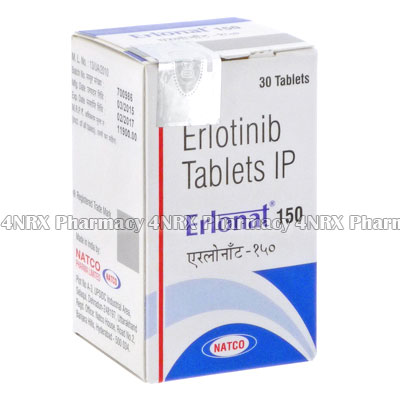 |
Home  Cancer Cancer  Erlonat (Erlotinib) Erlonat (Erlotinib) |
|
|||||||||
|
|
Erlonat (Erlotinib)
What is Erlonat (Erlotinib) used for? Erlonat (Erlotinib) is an oral medication used to treat patients who are suffering from non-small cell lung cancer or pancreatic cancer. The medication slows or stops the growth of cancer cells allowing other procedures to be performed to remove the tumours or destroy remaining the cancerous cells. Your doctor may prescribe its use for the treatment of other unlisted conditions, as well. How should I use Erlonat (Erlotinib)? Erlonat (Erlotinib) should always be used according to your doctor`s instructions and those included with the packaging to get the most effective results from treatment. The normal dosage is one tablet taken once daily, but your individual instructions will depend on your age, weight, current health, the condition being treated, and the severity of your symptoms. These doses should be swallowed whole and unaltered along with a large glass on an empty stomach to prevent nausea and aid absorption. Take the medication one hour before or two hours following a meal to ensure the stomach is empty. Do not change the form of the tablets by crushing or splitting them as this may destroy or alter the effects of their contents. What are the side effects of Erlonat (Erlotinib)? The use of Erlonat (Erlotinib) may cause side effects in some patients such as:
Serious side effects that may require emergency medical attention include faintness, irregular heartbeats, chest pain, trouble breathing, unusual swelling of the extremities, blurry vision, tinnitus, or seizures. Tell your doctor as soon as you experience any intense or worrying symptoms to make sure the necessary adjustments are made to your application frequency or dosage to stop further complications from occurring. Please Note Erlonat (Erlotinib) should not be used by patients who are under the age of eighteen, lactose intolerant, allergic to erlotinib, who have had a bad reaction to similar treatments, or who have severely reduced kidney function. You are also suggested to inform your doctor if you are being treated with other NSAIDs, have a glucuronidation disorder, a history of peptic ulcers, or if you have reduced liver and kidney function. These conditions may cause unexpected health problems requiring special adjustments your regimen. Strictly use Erlonat (Erlotinib) as prescribed and follow all instructions provided by your doctor. Safe, suitable, and optimum dosage can vary and is dependent on the patient`s health and medical history, as well as the condition you are treating. Erlonat (Erlotinib) may not be safe or suitable for all patients. Always ensure your doctor is informed if you are pregnant or breastfeeding, using any other type of medication (including non-prescription medicine, vitamins, and supplements), as well as if you have any allergies, other illnesses, or pre-existing medication conditions. Seek immediate medical attention or proceed to your nearest accident and emergency department if you suffer a hypersensitive or allergic reaction. Symptoms usually present during a reaction of this nature include difficulty breathing or swallowing, swelling of the limbs or face, tight chest, hives, and skin rashes. 
|
||||||||||||||||||